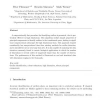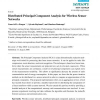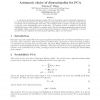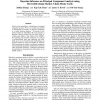CSDA
2008
14 years 3 months ago
2008
A computationally fast procedure for identifying outliers is presented, that is particularly effective in high dimensions. This algorithm utilizes simple properties of principal c...
CORR
2010
Springer
14 years 3 months ago
2010
Springer
Abstract: The Principal Component Analysis (PCA) is a data dimensionality reduction technique well-suited for processing data from sensor networks. It can be applied to tasks like ...
NIPS
2000
14 years 4 months ago
2000
A central issue in principal component analysis (PCA) is choosing the number of principal components to be retained. By interpreting PCA as density estimation, this paper shows ho...
NIPS
2003
14 years 4 months ago
2003
Principal components analysis (PCA) is one of the most widely used techniques in machine learning and data mining. Minor components analysis (MCA) is less well known, but can also...
WSCG
2004
14 years 4 months ago
2004
Principal Component Analysis (PCA) is a basis transformation to diagonalize an estimate of the covariance matrix of input data and, the new coordinates in the Eigenvector basis ar...
IJCAI
2003
14 years 4 months ago
2003
We present a coherent framework for data clustering. Starting with a Hopfield network, we show the solutions for several well-motivated clustering objective functions are principa...
AAAI
2004
14 years 4 months ago
2004
Based on the probabilistic reformulation of principal component analysis (PCA), we consider the problem of determining the number of principal components as a model selection prob...
ICONIP
2007
14 years 4 months ago
2007
Abstract. Principal component analysis (PCA) is a widely used technique for data analysis and dimensionality reduction. Eigenvalue decomposition is the standard algorithm for solvi...
FGR
2004
IEEE
14 years 6 months ago
2004
IEEE
Intra-personal space modeling proposed by Moghaddam et. al. has been successfully applied in face recognition. In their work the regular principal subspaces are derived from the i...
ICANN
1997
Springer
14 years 7 months ago
1997
Springer
A new method for performing a nonlinear form of Principal Component Analysis is proposed. By the use of integral operator kernel functions, one can e ciently compute principal comp...




